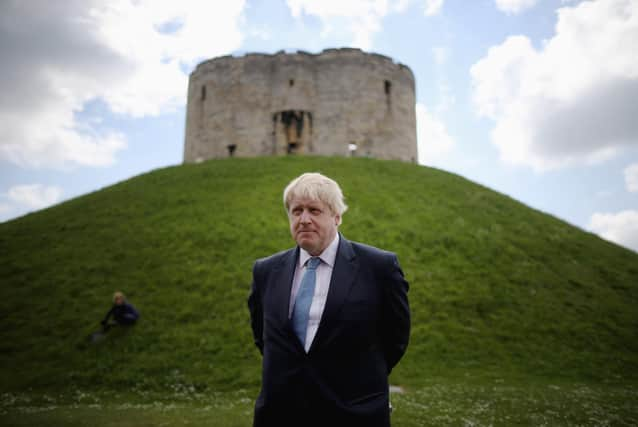Brexit's nostalgia-infused ideology is behind UK's new Aukus pact with US and Australia – Professor Peter Jackson


Biden returned to this theme repeatedly over the first six months of his presidency as he sought to convince America’s allies that the US was once again ready to provide global leadership.
Where Trump tended to characterise America’s allies as a drain on its resources, Biden instead talked them up as vital assets.
Advertisement
Hide AdAdvertisement
Hide AdAt first glance, last week’s announcement of a new strategic partnership between Australia, the United Kingdom and the United States (Aukus) is clear evidence that the US is serious about leading a firm western response to growing Chinese assertiveness in the Indo-Pacific region.
A closer look suggests that, like the withdrawal from Afghanistan, the Aukus pact is a sensible but badly executed policy that has damaged its relations with an important ally in France.
There is no denying the logic of bolstering international co-operation to preserve access to the South China Sea – one of the world’s major maritime arteries.
As part of the new security pact, the UK and the US have committed to share the technology Australia needs to build nuclear submarines. Although the new submarines will not carry nuclear weapons, the agreement to share this technology reflects the intimacy that characterises relations between these alliance members. But this move in the Pacific comes at a price.


Australia has pulled out of a 2016 contract to purchase 12 submarines from France, provoking quite spectacular French anger. A surprise given just two weeks before Australian ministers had reaffirmed their commitment to close strategic co-operation with France.
“This is not the way allies behave,” fumed foreign minister Jean-Yves Le Drian, adding that the behaviour of the Biden administration was reminiscent of Trump’s foreign policies.
France escalated tensions even further on Friday when it recalled its ambassadors to Australia and the US, underscoring it is the worst crisis in Franco-American relations since the 2003 US-led invasion of Iraq.
There is more to Gallic ire than disappointment at losing out on a defence contract. The loss of a high-profile defence contract in the run-up to 2022 presidential elections is a blow to President Emmanuel Macron. More irksome is the blow dealt to French policy in the Indo-Pacific theatre and the fact that Paris was neither consulted nor even informed with negotiations appearing to have taken place entirely without French knowledge.
Advertisement
Hide AdAdvertisement
Hide AdFor Washington, the accord is part of a renewed commitment to Barack Obama’s ‘Asian Pivot’. The snub to France also reflects its frustration with European reluctance to fall into line and support an assertive response to China at the G7 summit.
Yet it is hard to know what to make of a foreign policy that attaches great importance to coalition-building while at the same time pursuing projects that are bound to alienate partners.
The conclusion the French were always going to draw is that this latest expression of solidarity among ‘Anglosphere’ countries underscores the need for European ‘strategic autonomy’ independent of Nato – a development the Americans and the British have long opposed. A more patient approach based on traditional diplomacy might well have produced the same results at less cost.
The Australian perspective is clearly that US strategic support will always trump anything that France or any other country might provide. But there may also be costs for Canberra.
Australia is involved in lengthy and complex negotiations for a trade agreement with the EU. France can block these negotiations and the French foreign ministry has just declared that proceeding with these negotiations is “unthinkable” in light of the “breach of trust” that has occurred over the submarine deal.
Finally, where does all this leave the UK? Aukus is an undeniable success for Boris Johnson and his aspirations for ‘Global Britain’.
The accord underlines Britain’s status as a nuclear power and a player in the Indo-Pacific region. Supporters of the government will feel vindicated that post-Brexit, Britain can play a prominent role on the global stage. Yet there remain challenges as intractable as ever.
The essence of strategy is identifying your core aims and deciding how to use the resources at your disposal most effectively in pursuit of those aims. Size and geography dictate that the UK is a middle-ranking power with core interests in Europe. The nostalgia-infused ideology of Brexit, on the other hand, insists that Britain must always be a world power.
Advertisement
Hide AdAdvertisement
Hide AdBritish policy cannot square this circle without relying on American power. The great problem is that, since the mid-2010s, the priorities of US policy have shifted decisively away from the western hemisphere towards the Pacific. This means that committing resources in support of US in the Pacific threatens to undermine the UK’s ability to protect its interests in Europe and the Mediterranean.
This tension in British strategic posture was acknowledged, albeit implicitly, in the recent Integrated Review of Security, Defence and Foreign Policy. But there is no easy solution to the dilemma at the heart of the UK’s international policy.
The situation is made worse by growing uncertainty concerning American commitment to Europe. The nature of the UK’s problem is there for all to see in the policy somersault performed recently by Foreign Affairs Committee chair Tom Tugendhat.
On 18 August Tugendhat denounced the precipitate and chaotic withdrawal from Afghanistan before the Commons, implicitly questioning American reliability and whether the UK should reassess its relationship with the US. Less than a month later, the very same Tugendhat cited the Aukus Pact as “a powerful answer” to the “propaganda claiming that Washington wasn’t a reliable ally”.
At the heart of this quite stunning volte-face was the reality that the post-Brexit UK is an isolated second-rank power in need of partners.
Peter Jackson is professor of global security at the University of Glasgow and director of the Scottish Council on Global Affairs
A message from the Editor:
Thank you for reading this article. We're more reliant on your support than ever as the shift in consumer habits brought about by coronavirus impacts our advertisers.
If you haven't already, please consider supporting our trusted, fact-checked journalism by taking out a digital subscription.
Comments
Want to join the conversation? Please or to comment on this article.
